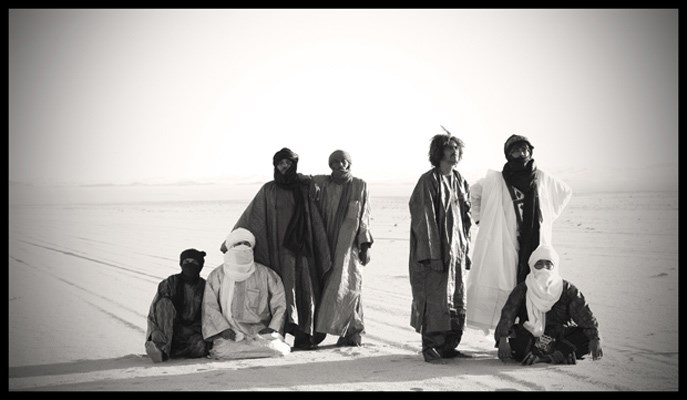Its not easy to pin down Tinariwen.
Like Toronto's Broken Social Scene, the North African band is a moveable feast of musical talent. The core members all met in Algerian refugee camps or in Libya where they trained as rebel soldiers in the late 1970s. Out of necessity, and to survive as their culture disintegrated around them in the post-colonial era, the young men became equally adept with both Stratocasters and Kalashnikovs.
They are children of the Sahara Desert and mountain regions of Northwest Africa where their Tuareg ancestors have lived for centuries in the open spaces.
Tuareg is actually an Arabic word used by outsiders to describe a group of people who call themselves Imouhar The Free People. "When I was young my family lived in the desert," says Tinariwen guitarist/composer Abdallah Ag Alhousseyni in French through an interpreter. "They still live there and when we want to see them thats where we go."
Abdallah was born in 1968 into a clan of Tuareg marabouts, Islamic holy men, living with their families in nomadic camps in the Tamesna, a vast desert region east of Kidal in north-eastern Mali.
Traditionally the Tuareg roamed with their camel and goat herds over much of the Sahara Desert prior to European colonization in the late 19th century. Even after borders were established the nomads were only seasonally contained within the confines of southern Algeria, Libya, Mali and Niger as they moved to meet the feeding needs of their animals.
Although most Tuareg groups now follow the Muslim faith many of their customs predate religious conversion and are uniquely their own. When Abdallah was growing up most of the men still wore veils over their faces while the women wore nothing on their heads. The Tuareg speak their own language, Tamashek, and write in an ancient alphabetic script, Tifinagh, which can be traced back thousands of years.
Women have always had an active role in all aspects of the Tuaregs matrilineal society. As primary carriers of tradition they were responsible for composing and performing most of the music heard at ceremonial and festive occasions. As a youngster Abdallah learned songs from the women of his clan as they sang, played the imzhad (one-string lute), clapped hands and struck percussion instruments to create their rolling, rhythmic call and response songs.
"My first musical souvenirs are basically all the traditional sounds that I listened to as a child," says Abdallah. "It was all local artists and local music. All the band members listened to this traditional music."
The social fabric of the Tuareg began to fall apart in the post-colonial era as drought, famine and political upheaval made life difficult to maintain in the desert. Ibrahim Ag Alhabib, founder of Tinariwen, was four years old when his father was executed in 1963 for aiding rebel Tuareg warriors fighting against the Malian government. Ibrahim grew up in refugee camps near Bordj Moktar and in the deserts around the southern Algerian city of Tamanrasset.
Its in the refugee camps where Tinariwens members, as teenagers, were introduced to modern music. Ibrahim made his own toy guitar out of a plastic gasoline jug and pieces of wood just like the one shown on the cover of the bands latest album Imidiwan:Companions.
Abdallah first saw guitars being played in Tamanrasset in 1977 but he was reluctant to play one himself as the instrument was foreign to their traditions. It would be 1984 before he joined the phalanx of guitars in Tinariwen and became a fully-fledged member of the band.
Tinariwen were together for almost two decades before they released their debut CD, The Radio Tisdas Sessions, on the World Village label in 2001. The band recorded the album in the studios of Kidals local station, Radio Tisdas, between 7 p.m. and midnight when the electricity was turned on. Producer Justin Adams (perhaps best known as a member of Robert Plants touring band) and French sound engineer Jean-Paul Romann captured the raw desert blues of Tinariwen as it blurred the lines between tradition and modernism.
As obvious fans of American electric blues and certain Western musicians (such as Santana, Led Zeppelin and the ubiquitous Bob Marley) Tinariwen have fused those outside influences with their own sound John Lee Hooker meets Ali Farqua Toure on the outskirts of Timbuktu.
Tradition grounds their work however conceptually Tinariwen keep all options open the band bends cultural rules without breaking them. Increased contact with the outside world has led to a myriad of changes but what makes them Tuareg remains intact. They cannot be contained, cornered or converted.
Over the course of the past decade Tinariwen have recorded four albums with the songwriting duties split between several of the members. Each musician has his own unique way of respecting tradition while continuing to push the envelope. Ibrahims hard-edged songs encompass a wide range of personal and social themes while Mohammed Ag Itlale (aka Japonais) writes confessional lyrics like a desert-based Loudon Wainwright III.
Sometimes words and music come together at the same time but for me usually the words come first, says Abdallah. As a composer he works with traditional elements to create something new with Tinariwen. His lyrics for Tenhert (The Doe), taken from a poem by Mohammed Asson Ahmed, read like classical court poetry. If it wasnt for the distortion and reverb on the electric guitars we could just as easily be listening to something from the 14th century.
Originally published Feb. 19, 2010. For more information on Tinariwen and North African music in general check out The Rough Guide to World Music. Folkways Records archival recording, Tuareg Music of the Southern Sahara, is an excellent sampler of traditional forms including courtly love songs, imzhad performances and trance workouts (Tazenkharet).



